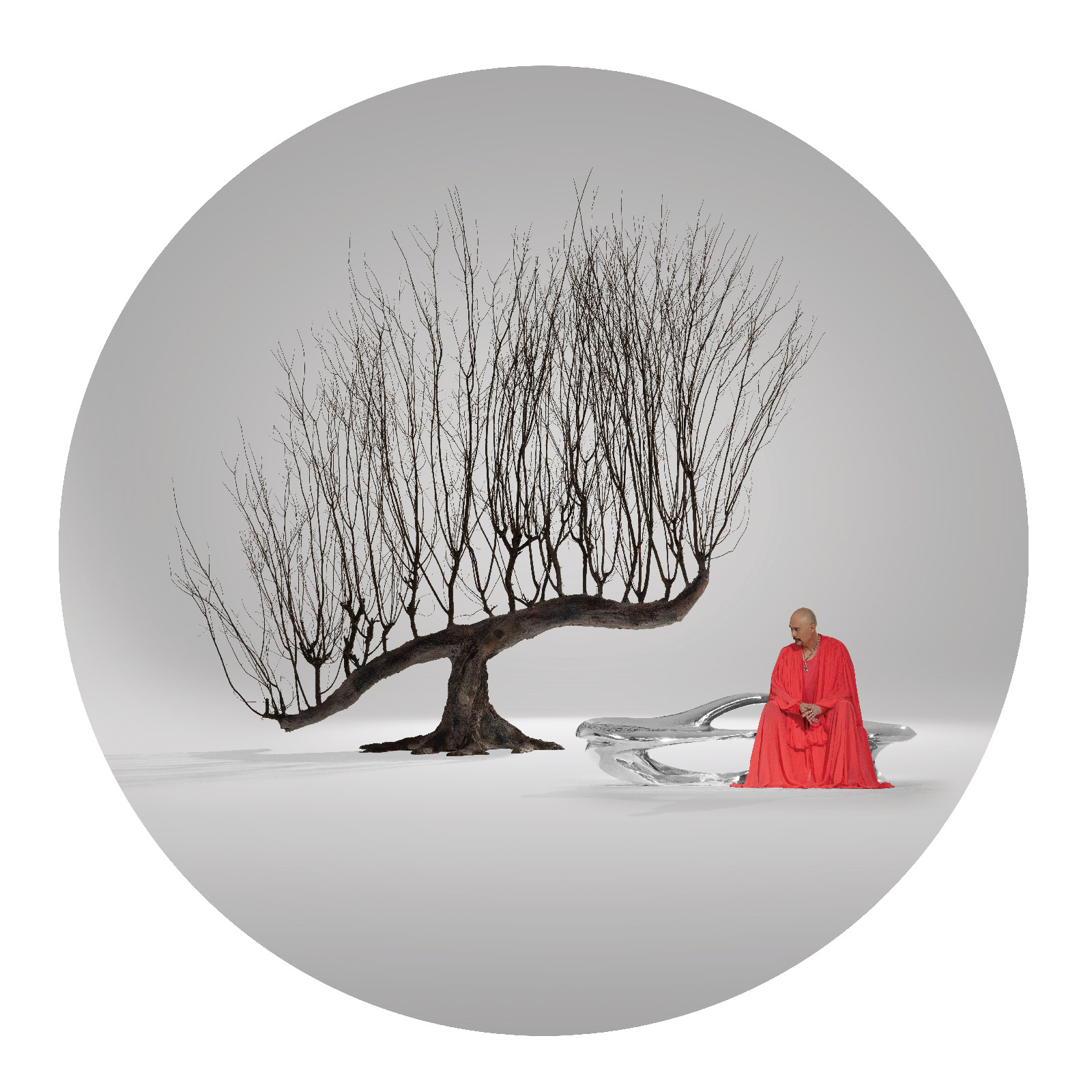

Zen-Revelation
Rongkai Li
Photography
2019
(Shanghai)
Zen masters meditate the nature of reality, and before preaching to people, they isolate themselves from the commonplace for spiritual revelation. My work presents such prospect via artistic forms.
Rongkai Li was born in Daliang mountains, near Shangri-la. He took photography as a career and worked more than a decade in Shanghai. He is interested in primitive mysticism and has endeavoured to use a surrealist approach for telling Chinese stories.
Interview of Rongkai Li
Does your Zen series reveal anything about borders, such as class, race, gender and religion?
First of all, the Zen series is based on traditional Chinese Buddhist philosophy, and it blended the surrealist technique as the formalist approach. Regarding the border of ideas, Zen cares more about the realm of personal life, reflecting the time lapses and disappearing life, rather than class, race, and gender. Buddhists hope to understand life and death, with which one can escape pains and sorrows. Zen tries to understand how to harmonised the relationship between the world and the individual from an innermost way. I hope to fuse borders to achieve new ways of expression.
Even though Zen series initiated before the occurrence of the pandemic, perhaps you had already sensed the world was reshaping, does it affect you in art-making?
I think humans can benefit from scientific advancement, however, we cannot rely on science as the only way to understand this world. We need to return to the beginning and remain pure to refresh our cognition. Adjusting our subjective way of thinking, with adapted attitude to the new world, we can gain new revelations, and this is the fundamental cause that drives me creating Zen series. I meditate that time means much more to human life than to inorganic substance, and the pandemic makes us clearer about the fragility of life and self. We should respect the world and its living beings more. This kind of respect is the highest value of humans, and that is what Zen is about.
What are the possibilities in photography? Which area that you want to make a breakthrough?
Photography is still full of possibilities. At present, so-called fashion photography did not progress much compared with the ones in the past few decades. I wish to rethink about it from its origin. Photography is an art that is based on an objective world, then expressed through the subjective view of the photographer. Conversely, creativity is limited by the medium, and artists are required to comply with the rules and then release the potential. Therefore a good photographer needs to have good taste. I think it can be a breakthrough if the methods of expression are highly compatible with the subjective ideal. Methods require good practice and good thinking requires artists’ taste. If the two can blend well, then the artwork can be ineffable and everlasting.
After the second world war, Pop art made mass-produced images parallel with the high art, and photography has been challenged by multi-media, easel painting and sculpture. Now short videos have gain popularity, do you think there are some traits photography should insist and some aspects need to adapt?
Admittedly, Pop art contributed to promoting photography, and it overthrew the hegemony of painting, unlimited the ways of expressing, essentially it is synthetic. However, as for me, form matters little insofar as the balance is concerned. By balance I mean art should not just about the surface, I am after the balance of the visual, considering the reception of the audience, not just artists’ catharsis. Indeed short videos are popular because humans can be satisfied by direct and simple delight. Short videos can fill human desires at a rapid speed. But I think photography will not be affected by it that much, because photography extends beyond the surface, it should be more insightful.
How has the pandemic affected you? Any wishful thinking about future art-making and exhibition?
The most influential aspect of the pandemic to me is that it made me humbler and respect life more. Art-making is a way for artists to express their feelings, and it is sublimated by the talent and understanding the society. It becomes apparent that online exhibition will be very popular, because it can address some issues in exhibiting art, such as rent for the actual space and fees. However, it would undermine the sense of the presence of art. As for still photographs, maybe complimentary videos and documents can help. I think to sum up the 5 interview questions, art-making primarily needs to move artists themselves, then to seek empathy of the audience, therefore we need to show respect and understanding about the individual as well as the other.
专访李荣凯
请问在创作 禅•悟 摄影系列的时候,你对世界上各种边界,比如阶级、种族、性别、信仰、民族等有没有什么个人的看法?
首先禅悟系列创作基于的是中国传统文化禅宗思想,从形式上说结合了欧洲超现实主义的手法,融合在一起。从思想边界上说,禅更关注个人生命的边际,对个人时间和生命流逝的思考,而关注的重点不在阶级、种族、性别等边界。从佛学讲,是了生死、离苦悲,从内心角度去思考如何感悟世界与个人的关系,如何融合。我希望通过对边界探索和融合,来产生新的表达方式。
虽然这一系列在创作的时候新冠疫情还没有来临,但想必你已经感受到了世界格局在发生变化,是否可以谈一下在创作时你的思考?
我觉得生物科技的发展对人类发展虽然有很多好处,但我们对自我的认知不能光靠科学作为唯一的依据,而更需要对思维基底和纯真有新的认知。调整好自己创作的主观思维和心态,能够面对新形势出现的变革,从思维脉络上能有新的领悟,这也是我创作禅•悟的根本原因。我思考的是时间对人类生命的意义,要比无机物更有感知,而新冠疫情的出现,使得我们更清楚的认识到,生命的渺小和自我的渺小。我们应该更加尊重世界万物的生灵,这种尊重是人类最高价值的体现,也就是禅悟。
你认为摄影艺术发展到了当代还有哪些新的可能性,你的创作突破口在哪里?
摄影艺术的可能性很多,现在所谓的时尚摄影和过去几十年的风尚没有太多进步。我希望从摄影本源思考,摄影是一种有中生有的艺术形式,首先要有客体,然后才能生出艺术家的想法。相对来说,创作框架和灵活度有限制,艺术家要从客观框架下,表达主观想法,这对艺术家的审美能力提出了很高的要求。我认为突破口,更多是在表现形式与艺术家思维源泉之间的高度匹配。表现形式需要实践技术,而思维需要艺术家的修养,如果能把两者整合到位,那么作品会变得隽永,让人意犹未尽。
自二战后,波普艺术兴起,摄影作为大众传媒的独特媒体,受到了多媒体、架上绘画、雕塑等冲击;现在短视频也不断刷新热度,你在创作禅悟的时候,有哪些坚持,在后新冠时代是否会有所调整?
波普对摄影艺术有很大的推动作用,它打破了画笔创作的旧有方式,在表现形式上不受限制,是一种整合的艺术。但对我来说,不管艺术的表现形式如何,但艺术需要一定的平衡性,而不应该仅仅浮于表面。我追求的是画面的平衡感,会考虑到观众的体验,而不仅是艺术家自我宣泄。短视频现在很流行,因为人有简单粗暴和强烈欲望的性质,而短视频非常直接了当,可以快速满足人的欲望。但我认为这与艺术摄影关系不大,我认为艺术摄影有很强的延展性,应该有启示意义。
新冠时代对你的影响主要有哪些,你认为艺术创作和展览在未来理想的状态应该是什么样的?
疫情对我的影响主要在让我变得更加谦卑,尊重生命。艺术创作是艺术家情感的释放,是艺术家对世界、社会等方面的通过天赋而进行的提炼。可以预见在线展览会是一种受欢迎的形式,因为它可以解决场地和费用方面的一些问题。但这样的临场感就会被削弱,就静态摄影而言,也许配合动态的纪录片和创作过程的短片展示,会更立体一些。我觉得综上五个问题,艺术创作首先要让自己感动,然后再感动他人,因此需要理解和尊重个体和客体。